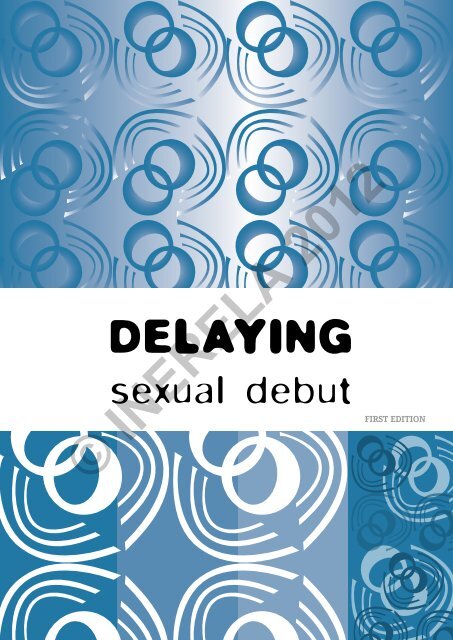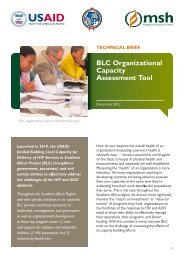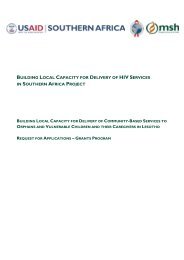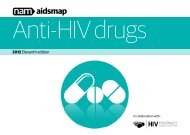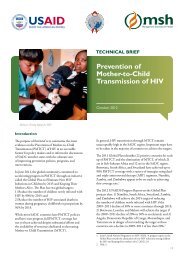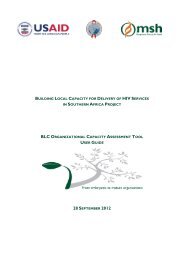Delaying Sexual Debut
Delaying Sexual Debut
Delaying Sexual Debut
You also want an ePaper? Increase the reach of your titles
YUMPU automatically turns print PDFs into web optimized ePapers that Google loves.
DELAYING<br />
sexual debut<br />
© INERELA 2012<br />
first edition
Session Objectives<br />
Session Overview<br />
Key Message<br />
Expected Learning<br />
Outcomes<br />
Time<br />
<strong>Delaying</strong><br />
<strong>Sexual</strong> <strong>Debut</strong><br />
Introduce participants to the benefits of encouraging young people to delay<br />
their first sexual experience.<br />
This session includes several discussions on how to help teenagers delay<br />
their sexual debut. It involves discussions with teenages about their sex<br />
and sexuality and what they would like to know about sex and taking<br />
sexual responsibility for themselves.<br />
Having sex when we are emotionally and physically ready to handle the<br />
experience reduces HIV transmission.<br />
Understand the benefits of delaying sex.<br />
Know where you can get sexual health information for young people.<br />
Better understand of how to engage with young people about sex.<br />
Reducing the awkwardness of addressing sex<br />
Understanding the pressure young people face.<br />
Cultural/social/economic factors around sex<br />
© INERELA 2012<br />
1 hour<br />
Materials needed:<br />
• z Flipchart<br />
• z Markers.<br />
2
Note to the facilitator:<br />
Young people will be engaging in thinking about sex. We are designed to<br />
explore who we are as sexual beings. This is a module about how to engage<br />
with teenagers about delaying their first sexual experience. The focus here<br />
is on good overall sexual health. There is information about good sexual<br />
health throughout the toolkit so please refer to those if specific questions<br />
need to be addressed. It also makes it clear as to why it is beneficial for<br />
young people to delay.<br />
The strength of this module lies in NOT giving the<br />
following messages:<br />
• zTeenage sex will get you pregnant.<br />
• zTeenage sex will leave you with a sexually transmitted<br />
infection<br />
• zTeenage sex is bad<br />
These messages only serve to make teenagers<br />
ashamed of their sexual desires and feelings. We need to communicate<br />
healthy messages and through these give teenagers<br />
the confidence and information to take responsibility for their<br />
own sexual health. <strong>Delaying</strong> your sexual debut is about SAVING<br />
sex until you find that person you wish to share it with in love,<br />
usually within the bounds of a committed relationship.<br />
© INERELA 2012<br />
We are designed to explore<br />
who we are as sexual<br />
beings.<br />
3
Studies have been carried out in the United States 1 that clearly show that the more<br />
accurate information teenagers have about sex the more responsible they become<br />
about their sexual health. They automatically seem to delay their first sexual experience,<br />
they have fewer partners and are less at risk for sexually transmitted illnesses<br />
and pregnancy.<br />
Discussion:<br />
Either in small groups or in the larger group as the participants the following:<br />
• z What do they count as sex?<br />
• zWhen and how did you learn about sex?<br />
Write as many of the responses down as you can. Then, once the discussions<br />
have been completed classify these into good and bad experiences.<br />
Also, classify any form of violent sexual experience as extremely damaging<br />
(“bad” is simply to mild a word to describe what some people experience).<br />
In many contexts you will find that the majority of the participants<br />
have had little or no sexual education until they had their first experience.<br />
• zWhat effect did the way you learnt about sex impact on you?<br />
Once again you will find quite a lot of negative experiences coming out.<br />
• z What would you do differently to change your own sexual knowledge.<br />
Activity:<br />
Ask the group to design a simple framework for communicating about<br />
sex to others.<br />
• zWho would be the ideal person to talk to about sex?<br />
• zWhat would you want to know?<br />
© INERELA 2012<br />
Activity:<br />
(This activity is included in the gender and sexuality module but this is also a good<br />
place to include it). It is appropriate for both adults and teenagers but it is better<br />
to have separate groups.<br />
Draw a line across some paper and ask people to write on there the<br />
different stages of sexual interaction to the end of sex. This can be<br />
done in small groups or in a bigger group if you think this to be more<br />
appropriate.<br />
4
Give the participants a good 20-30 mins to complete this exercise.<br />
Try and encourage the participants to think through their own sexual<br />
experiences and put in as much detail as possible.<br />
Once this has been done ask the participants what is considered to<br />
be sex?<br />
• zInterestingly you will find the most adults will regard sex as kissing,<br />
and everything after that is considered to be sex and, often,<br />
taboo to speak of.<br />
• zTeenagers have a range of responses but most link sex with the<br />
genital regions<br />
Have a discussion about how these understandings about sex affect<br />
how we communicate about sex. Look at the different sexual acts and<br />
decide about what you would like more information. This may be an<br />
appropriate place to address these issues or you may like to wait and<br />
answer these under the sex, sexuality and gender module<br />
I lectured at a local school... Afterwards, several young men came up<br />
to me and told me that the girls they were having sex with didn’t even<br />
ask them to use condoms – in fact they had even told these boys, ‘It’s<br />
OK – you don’t have to use anything.’ These girls...perceived discussing<br />
contraception with their boyfriends as putting their worth at stake 2 .<br />
Discussion:<br />
• zWhat are these teenagers exposing themselves to by engaging in unprotected<br />
sexual behaviour?<br />
• zThese where teenagers from about 13 – 18. What are the implications<br />
of engaging in unprotected sex at this age?<br />
• zWhat choices do we have in ensuring that teenagers make sexual<br />
choices that protect them? What can we do?<br />
© INERELA 2012<br />
5
Notes:<br />
Sex is a normal, natural part of life. As human beings, we have been given a long period<br />
of time to prepare our minds, bodies and hearts for the beauty of a positive sexual<br />
experience. We need to give our teenagers comprehensive sexual education to ensure<br />
they have the knowledge necessary to make informed choices. Shame: A sense of shame<br />
about sex and sexuality is reinforced during puberty. If we communicate openly and<br />
honestly about sex, about the joy and beauty of it, about the mechanics of it and about<br />
the dangers of it more teenagers would choose to honour sex as sacred. From the Judeo-<br />
Christian scriptures:<br />
How fair and pleasant you are, O loved one, delectable maiden! You are<br />
stately as a palm tree, and your breasts are like its clusters. I say I will<br />
climb up the palm tree and lay hold of its branches. Oh, may your breasts<br />
be like the clusters of the vine, and the scent of your breath like apples,<br />
and your kisses like the best wine that goes down smoothly gliding over<br />
lips and teeth.<br />
I am my beloved’s, and his desire is for me. Come, my beloved, let us go<br />
forth into the fields, and lodge in the villages; let us go out early into the vinyards<br />
and see where the vines have budded, whether the grape blossoms<br />
have opened. There I will give you my love 3 .<br />
This is a challenge to us all to engage in beautiful sexual relationships. If we communicate<br />
openly and honestly about sex - the joy, beauty, mechanics, and dangers - teenagers<br />
will be more likely to choose to honour sex as sacred.<br />
Social/environmental/economic factors<br />
• zThe concept that girls should be virgins and boys must have experience. Is this the<br />
norm in your culture and how can it be challenged? (Look at concepts of masculinity<br />
and femininity and what is associated with these roles).<br />
• zPower dynamics; sex in return for something else e.g. money/grades/schooling/job/<br />
clothes/airtime (credit) on cell-phones<br />
• zFamily situations where sexual abuse is an issue.<br />
Self-esteem/body image/metal health<br />
• zPeer pressure and pressure from a partner<br />
• zValue of your body and realize that it is something that has to carry you through life,<br />
love yourself.<br />
• zSelf-confidence in yourself and not needing a partner to complete yourself<br />
© INERELA 2012<br />
Resources<br />
• zWhat sex education are they already having and from where?<br />
• zWhat misinformation are they getting and from where?<br />
• zWhat young people services are available in the area?<br />
• zUnderstand that young people may be sexually active with sex and need to be able to<br />
speak to someone when they do in a non-judgmental way.<br />
6
Discussion:<br />
Try to get the group to discuss when they debuted and what thoughts they<br />
have about it, do they regret it? Was it a negative or positive experience,<br />
how many people are still with their first person, how many waited till<br />
they were married, what pressure did they feel under and pressure from<br />
whom?<br />
• zWhat age do they think young people start having sex in their community?<br />
• zAt what age do they think they should start to address the issue of sex<br />
with young people? Are there social/economic factors that are being<br />
placed on young people pushing them towards having sex at a young<br />
age? If yes how do you address these issues?<br />
Supporting people living with HIV<br />
Young people are vulnerable, where a lack of education can put them in harms way<br />
– Is the price of an awkward conversation worth your child and others health?<br />
Young people living with HIV need to know how they can have sex in a responsible<br />
and healthy way and to know they are entitled to the same experiences as everyone<br />
else.<br />
Young people living with HIV in the family – need support to show them ways to<br />
engage in sex in a safer way and that sex is not a way in which to seek attention or<br />
to act out.<br />
Empowering Communities<br />
Is there a safe space for young people, where they can chat to someone about issues,<br />
sex and prevention in a non-disclosure private environment?<br />
Activity<br />
Ask participants how they can design and encourage a space for<br />
young people to talk about sex.<br />
• zWhere, what will it look like, who will be involved etc<br />
© INERELA 2012<br />
Make more information available in place where young people are.<br />
Open up the lines of communication in a positive way that does not show sex to be<br />
a sin, but it is something that requires thought and is a big step.<br />
7
SSDDIM<br />
If you approach the issues of sex in a way that is judgmental, aggressive, doctrinal<br />
and non-approachable then you are reinforcing the concept that SEX = SIN and the<br />
cycle of HIV continues. People’s attitudes towards sex needs to change in a way that<br />
helps to create safer behavior patterns that do not put people’s health at risk.<br />
By not talking about sex and the issues that surround it, you are creating a wall that<br />
drives the issues underground, making it a taboo subject. Stigmas around sex and<br />
sexual debut need to be address from across the community in order to maintain the<br />
safety of young people and the reduction of HIV.<br />
Change is more likely to take place when people see change as a good thing, something<br />
that they will benefit from and supported by friends, family and the community.<br />
People are more likely to resist when they see something as an obstacle, there<br />
is no support and no education available. The key is to work alongside local beliefs,<br />
customs and traditions and teach them ways to make them safer rather than try to<br />
abolish the practice all together. This approach enables people to embraces safer<br />
practices and allows for positive behaviour change rather than fighting something<br />
alien and imposed.<br />
(Endnotes)<br />
1 www.psi.org<br />
2 Norhtrup, Dr Christopher ‘Womens Bodies Womens Wisdom – The Complete<br />
Guide to Womens Health and Welbeing’ 2000 PIATKUS Pg 235<br />
3 Song of Solomon 7: 6-12<br />
© INERELA 2012<br />
8
Reflection and Notes<br />
© INERELA 2012<br />
9
Reflection and Notes<br />
© INERELA 2012<br />
10
Reflection and Notes<br />
© INERELA 2012<br />
11
SAVE<br />
© INERELA 2012<br />
TOOLKIT<br />
A Practical Guide to the SAVE Prevention Methodology


